四年级英语上册上海牛津版学习材料整理
上海牛津版小学四年级英语上册辅导资料分解

上海牛津版小学四年级英语上册辅导资料Unit 1(Module 1)Meet new people【单词】eleven twelve thirteen fourteen fifteen sixteeneleven十一twelve十二thirteen十三fourteen十四fifteen十五sixteen十六【拓展单词】classmate同学one two three four five six seven eight nine t en【其它】单词认识,知道know遇见meet人,人们people同班同学classmate校友schoolmate十七seventeen十八eighteen十九nineteen二十twenty数数count数字,号码number学号school number在……附近near同学classmate走到学校walk to school,go to school on foot每天every day喜欢读书like reading打篮球play basketball踢足球play football一个新学生 a new student【基本句型】This is ... (介绍用语) 这是、、、See you. 再见。
- Nice to see you. 很高兴见到你。
- Nice to see you too. 也很高兴见到你。
【语法】1. 形容词性物主代词my, her, his, your在英语中有物主代词,它可以分成名词性的和形容词性的。
形容词性物主代词相当于形容词,置于名词前,在句子中用于修饰名词,做定语,后面必须跟一个名词。
例如:This is my brother. His name is Tom. 这是我的哥哥。
他叫汤姆。
形容词性物主代词有人称和数的变化,单数形式:my(我的),your(你的),his /her/its(他的、她的、它的)。
复数形式:our(我们的),your(你们的),their(他们的)。
沪教牛津版四年级英语上册全册知识点汇总清单
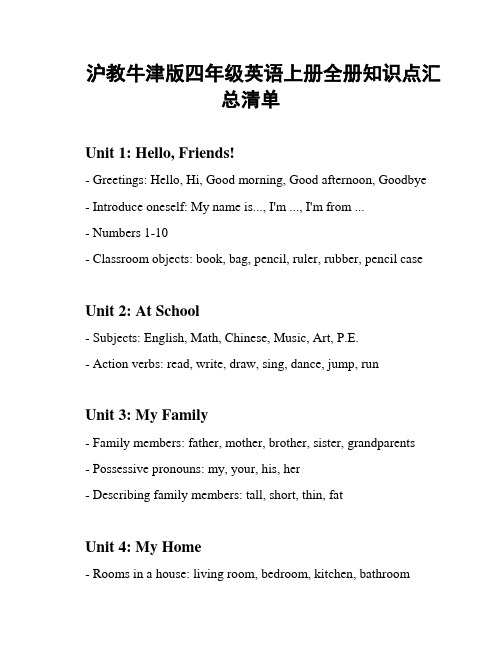
沪教牛津版四年级英语上册全册知识点汇总清单Unit 1: Hello, Friends!- Greetings: Hello, Hi, Good morning, Good afternoon, Goodbye - Introduce oneself: My name is..., I'm ..., I'm from ...- Numbers 1-10- Classroom objects: book, bag, pencil, ruler, rubber, pencil caseUnit 2: At School- Subjects: English, Math, Chinese, Music, Art, P.E.- Action verbs: read, write, draw, sing, dance, jump, runUnit 3: My Family- Family members: father, mother, brother, sister, grandparents- Possessive pronouns: my, your, his, her- Describing family members: tall, short, thin, fatUnit 4: My Home- Rooms in a house: living room, bedroom, kitchen, bathroom- Furniture: sofa, bed, table, chair- Prepositions of place: in, on, under, behindUnit 5: Food and Drinks- Food and drinks vocabulary: noodles, rice, bread, milk, juice, water- Expressing likes and dislikes: I like..., I don't like..., Do you like...?Unit 6: Toys and Games- Toys vocabulary: ball, doll, teddy bear, robot, car- Indoor and outdoor games: hide-and-seek, catch, jump rope, kickball- Expressing preferences: I prefer..., I don't prefer...Unit 7: My Body- Parts of the body: head, eyes, nose, mouth, arms, legs- Action verbs: see, hear, smell, taste, touch, speak, walk, jump- Asking and answering about body parts: What can you see with? I can see with my eyes.Unit 8: Clothes- Clothing vocabulary: T-shirt, dress, skirt, trousers, shoes- Colors: red, blue, yellow, green, orange, purple- Describing clothes: big, small, long, short, new, oldUnit 9: Weather- Weather vocabulary: sunny, rainy, cloudy, windy, snowy- Expressing feelings about weather: I like sunny days. I don't like rainy days.Unit 10: Holidays and Festivals- Holidays and festivals: Christmas, New Year, Spring Festival- Traditional activities: giving presents, fireworks, lion dance- Expressing holiday greetings and wishes: Merry Christmas, Happy New Year, Happy Spring Festival。
四年级英语上册上海牛津版读物整理

四年级英语上册上海牛津版读物整理本文档整理了四年级英语上册上海牛津版的读物内容。
具体的内容包括但不限于以下部分:本单元主要介绍了学校的情况和学生的个人信息。
学生将研究如何问候和介绍自己,还将了解学校的不同地方和学校活动。
单元二:In the Classroom本单元围绕教室的内容展开,学生将研究一些学科的英文单词,以及如何在课堂上进行简单的对话。
单元三:In the Park本单元以公园为主题,学生将研究有关自然、季节和游玩的词汇,还将了解公园中的不同活动和设施。
单元四:At Home本单元将聚焦在家庭生活方面,学生将研究有关家庭成员、房间和家务的词汇,还将研究如何询问和回答有关日常活动的问题。
单元五:Food and Drinks本单元将为学生介绍食物和饮料的内容。
学生将研究有关不同食物和饮料的词汇,以及如何进行简单的点餐对话。
单元六:My Body本单元将介绍有关身体部位和感觉的内容。
学生将研究相关的词汇,以及如何描述身体不适和感受。
单元七:Celebrations本单元将介绍一些节日和庆祝活动。
学生将研究节日的词汇和庆祝方式,还将了解不同国家和文化中的节日差异。
单元八:Occupations本单元将聚焦在职业方面,学生将研究有关不同职业的词汇,并了解他们的工作内容和职责。
单元九:Our Country本单元将介绍一些有关国家和文化的内容。
学生将研究国家的名称、地理位置和文化特点,以及一些基本的国家标志。
以上是四年级英语上册上海牛津版读物的内容整理。
通过学习这些内容,学生将能够扩大英语词汇量,提高语言表达能力,并了解一些与日常生活相关的话题和文化知识。
牛津上海版小学英语四年级上期末复习资料

牛津上海版小学英语四年级上期末复习资料牛津版简介牛津英语(上海版)教材的特点:趣味性强,生动形象,图文并茂,教学内容时代感强;起步高,容量大,信息多;语言地道,复现率高;重视能力的培养,尤其是重视以语言为工具,解决专项任务的运用能力。
以下就为牛津版上海教材为学习材料,整理了各册主要学习内容,希望对孩子的学习有所帮助!1. 学情分析四年级上学期学情特点是综合对话增多,绘本阅读量增大并知道大意,时态开始新授应用,口语系统连续对话要求增大,写作句型增多且应用广泛,以及考试难度增大的学情特点。
对话场景:介绍问候、能做什么?、感觉如何?询问人称?、询问职业?、描述存在地点、一般疑问询问?、询问价钱?、在哪里?、天气如何?祈使句2. 基本词汇120个(数词、人称、职业、衣物、地点、食物、天气、月份、形容词、动词)3. 基本句型① Her/ His name is …She’s …(Getting to know you –Meeting new people 2 页)Kitty : Good morning , Peter .Peter: Good morning , Kitty.Peter : This is my sister . Her name is Sally . She’s twelvePeter: And this is my brother . His name is Paul . He’s only sixPeter : We are going to the park . Goodbye, Kitty .Alice : See you备注:第一次出现将来进行时时态句子be going to② Can she…./ Yes, she can ;No, she can’t (Gettingto know you –Abilities 8 页 )Kitty : Can Supergirl paint a picture ?Alice : No, she can’t , but she can run fast .Kitty : Can she swim ?Alice : Yes, she can swim very wellKitty : Can you swim , Alice ?Alice : Yes , she can swim very well .备注:第2次出现,上次出现二年级下③ How do you fell ? I’m / We ‘re …(Getting toknow you –How do you feel ? 12 页 )Kitty: I’m happy . I have a new skateboardDad: I’m sad . Look at my bicycle !Dad: We’’re back .Mum : How do you feel ?Dad : We’re tired备注:类似第2次出现,上次是三年级下 How does it / do they feel ?④ Do you have … ? Yes , I do / No, I don’t ( Me, my family and friends ---Jill’s family 17 页)Uncle : Hi ,JillJill : Hi !Peter : Who’s that man ?Jill : Oh , that’s my uncle . He’s my mother’s brother . He’s my mother’s brother . He’s a police officer .Peter : Do you have any brothers and sisters ?Jill : No , I don’t , but I have a cousin . Do you have any uncles and aunts , Peter ?Peter : Yes , I do . I have one uncle and two aunts , and I have four cousins .⑤ What does …do ? He / She is …? ( Me , my family andfriends ---Jobs 23 页 )Kitty : What does your father do ,Jill ?Jill: He is a firefighterKitty: What does your mother do ?Jill : She is a nurse⑥ I have / He has …( Me , my family and friends ---I havea friend 27 页 )He’s / She’s ….I have a friend .His name’s TomHe’s tall and thin .He has a green T-shirt and a pair of blue shorts .He can skate备注:I have 第5次出现,上次是二年级下和三年级下He's / She's 第3次出现,前量词一年级上和三年级上⑦ This / That / It is …( Places and activities---In our school 33 页 )Welcome to Rainbow Primacy School.This is our classroom buildingThis is the teachers’ office .Look ! Miss Fang is busy now备注:出现3次,上次是二年级上和三年级下⑧ There is /are …( Places and activities ---In our school33 页 )This is our computer labThere are many computer in itThere is a playground.It’s behind the classroom buildingWe can run and play there备注:出现2次,上次是三年级上备注:介词on、in、in front of 、behind的用法⑨ Where is ….? ( Places and activities ---Around my home 37 页)Alice : Where is your home , Jill ?Jill: It’s at No. 126 Garden Street .There are many shops near my homeAlice : Is there a park near your home ?Jill: Yes , there is . It’s behind my homeJill: Where is your home ,Miss Fang ?Miss Fang : Guess .It’s on a busy street in our city .Jill: Are there any shops ? Is it on Park Street ?Miss Fang : Yes . There are some shops , a supermarket ,some restaurants ,and a park .备注:第3次出现,前2次是一年下和三年级上⑩ Is/Are there …? Yes, there is /are. / No, there isn’t / aren’t ( Places and activities ---Around my home 37页 )Alice : Where is your home , Jill ?Jill: It’s at No. 126 Garden Street .There are many shops near my homeAlice : Is there a park near your home ?Jill: Yes , there is . It’s behind my homeJill: Where is your home ,Miss Fang ?Miss Fang : Guess .It’s on a busy street in our city .Jill: Are there any shops ? Is it on Park Street ?Miss Fang : Yes . There are some shops , a supermarket ,some restaurants ,and a park .⑾ How much is it / are they ? It’s / They’re ..( Places andactivities ---In the shop 43 页 )Kitty : A small packet of sweets , pleaseShopper : Here you are .Kitty : How much is it ?Shopper : It’s twelve yuan ,pleasePeter : And two ice creams, please . How much are they ?Shopper : They’re five yuan ,please备注:第3次出现,上前2次是三年级上下⑿ Don’t … Let’s …(The natural world ---A visit to a farm 48 页 )Mr MacDonald : Good morning ,children .Mr MacDonald : Good morning , Miss Fang .Miss Fang : Don’t litter on the farm .Please put the rubbish in the rubbish bin .Danny : Yes ,Miss FangMr MacDonald :Please don’t walk on the grass.And don’t pick flowersDanny : OK, Mr MacDonaldMr MacDonald : Now let’s visit the farmMiss Fang :Great ! Let’s go !备注:Don’t 第2次出现,上次是二年级上⒀ These are …(The natural world ---A visit to a farm 49 页 )Mr MacDonald :These are my horsesKitty : I like horsesMr MacDonald :What do they eat ?Kitty : They eat hayMr MacDonald :These are my cows and sheep . They like grass .Mr MacDonald :Here are some hens and ducks too. They‘re hungry . They all like corn备注:第2次出现,上次是三年级下⒁ Whatdo they eat ?... (The natural world ---A visit to afarm 49 页 )Mr MacDonald :These are my horsesKitty : I like horsesMr MacDonald :What do they eat ?Kitty : They eat hayMr MacDonald :These are my cows and sheep . They like grass .Mr MacDonald :Here are some hens and ducks too.They're hungry . They all like corn⒂ Where is …? (The natural world ---At CenturyPark 53 页 )Miss Fang : Hi , boys and girls . Let’s go to Century Park and have a picnicDanny : Where is Century Park,Miss Fang ?Miss Fang : It’s far away from our school .We can take the school bus there备注:第4次出现,前3次是一年下和三年级上和四年级上⒃ What do you have …? (The natural world ---At Century Park 53 页 )Miss Fang : Are you ready , boys and girls ?Students : Yes ,we areMiss Fang : What do you have , Danny ?Danny : I have a cap and a bottle of water .Jill : What do you have , Kitty ?Kitty : I have a camera备注:第2次出现,上次是二年级下⒄ These are …(The natural world ---At Century Park 55 页 )Look,these are my photos .This is Danny .He has a capHe is besides the fountain.And this is Alice .She is playing on the swing .She is happy .(时态2次出现)备注:第3次出现,前2次是三年级下和四年级上现在进行时首次出现⒅ How’s the weather in….? (The natural world---Weather 57 页)Jill : I’m Jill . I live in China. I have a friend , Amy .She is from AustraliaJill: This is my friend Amy .She lives in Australia. We often make phone calls to each otherJill: It’s sunny and warm here . How’sthe weather in Australia now ?Amy : It’s cool and windy .In May and June , it's always cool here .Jill: How’s the weather in December then?Amy : It’s sunny and hot备注:第2次出现,上次是一年级下⒆ What are they ? (The natural world ---Weather 59 页 )Miss Fang : There are four seasons in a year.What are they ?Jill : They’re spring ,summer ,autumn and winterMiss Fang : Very good ,Jill .How’s the weather in spring ?Danny : Spring is nice . It’s warm .It’s not cold . The plants grow and grow .The leaves are green .And we can see many beautiful flowersMiss Fang : Do you like spring ,Peter ?Peter : No, I don’t . I like autumn .Miss Fang : How’s the weather in autumn ?Peter :It’s cool and dry . The leaves fall and fall , We can fly kites in the park and play football in the playground .备注:第3次出现, 前2次是二年级下和三年级上⒇ Doyou like ? (The natural world ---Weather 59 页 )Miss Fang : There are four seasons in a year.What are they ?Jill : They’re spring ,summer ,autumn and winterMiss Fang : Very good ,Jill .How’s the weather in spring ?Danny : Spring is nice . It’s warm .It’snot cold . The plants grow and grow .The leaves are green .And we can see many beautiful flowersMiss Fang : Do you like spring ,Peter ?Peter : No, I don’t . I like autumn .Miss Fang : How’s the weather in autumn ?Peter :It’s cool and dry . The leaves fall and fall , We can fly kites in the park and play football in the playground .备注:第5次出现,前4次出现一年下和二年级下和三年级下4. 口语句型① This is …(Getting to know you –Meeting newpeople 2/4页 )See you.Nice to meet youNice to meet you② Welcome to …(Getting to know you –Abilities 9页 )③ Have some…(Getting to know you –How do you feel ? 14/15页 )Thank you.Sorry.I have an idea !④ Really ? ( Me , my family and friends ---Jill’s family19/20页 )Let’s have⑤ You’re welcome. ( Me , my family and friends---Jobs 25页 )⑥ What’s the matter ? ( Places and activities --In ourschool 35页 )I don’t think soCome on !Have a try !⑦ Excuse me ( Places and activities ---Around my home 39页 )Let me seeIt’s our pleasure⑧ Don’tworry . ( Places and activities ---In the shop 45页 )⑨ Are you ready ? (The natural world ---AtCentury Park 53/54页 )Of course⑩ Merry Christmas ! (The natural world ---Weather 60页 ) 5. 知识重点①能听懂会说新授词汇,以及会分类识别②能听懂、会说对话③会唱儿歌和歌曲④固定句型的考试应用6. 知识难点①使用日常对话进行操练②培养学生英语学习兴趣和良好的学习习惯③时态句型的应用④句意逻辑判断以及阅读应用⑤音标的辨音及同音词⑥人称的各类用法,及名词所有格⑦ Be动词的用法⑧单复数及特例,例如一双是单数,两双是复数,以及There be …and….⑨缩写形式和完整形式⑩反义词和近义词7. 典型习题Ⅰ.Choose and write ( 选出最恰当的答案 )① I have a sister . ( ) name is JillA. SheB. HisC. Her② Can you ( ) ?A. swimB.swimsC. swimming③( ) are these potatoes ? ---They are twelve yuanA. How manyB. How muchC. How old④ ( ) is the weather ? ---It’s windyA. WhatB. HowC.Where⑤ Are there ( ) shops on Green Street ?A. anyB. someC. much⑥There ( ) a square and two stars in the pictureA. isB. areC. have⑦ What can you do ? ( )A. I can writeB. I like swimmingC. I go shopping⑧ Are you hungry ? ( )A. Yes,I amB. No,I don’tC. Yes,I can⑨( ) .---Yes, there isA. Are there any restaurant?B. Is there a park ?C. Is it near thesupermarket ?⑩ What does your uncle do ? ---( )A. He lives in GuilinB. He is a driverC. She is a nurse⑾ What would you like ?---( )A. I like milkB. I’d like some coffeeC. I like watching TV⑿ What’s the matter ? ---( )A. I’m tiedB. I want to skateC. I like the black T-shirtⅡ. Read and write (辨音,用T 表示相同, F 表示不同)( ) name make have( ) desk seven these( ) bottle sorry orange( ) lunch sunny pupilⅢ. Choose and write (补全对话 ))( 1 ) 从所给出的单词中选出合适的完成对话supermarket meat shopping rainy tomatoesTom : Mum, there is no food at home . Let’s go( ) todayMum: But how’s the weather ?Tom : It’s a sunny day . It’s not ( )Mum : OK ,Is there any ( ) in the chickenTom : No, there isn’tMum : Are there any ( ) or potatoes .Tom : There aren’t any potatoes but there is only one tomatoMum: All right . Let’s go to the ( ) now .( 2 ) 试从所给出的句子中选出合适的完成对话A. I need newdressB. How are you ?C. You can have my monkeyD. Are you busy now?E. Would you like to go shopping withme ?Cindy : Hello , Linda ( )Linda : Fine , thanks . Nice to see you here ,CindyCindy : ( )Linda : No ,I’m not busy . I just go out to walkaroundCindy : ( )Linda : Sure But I don’t take moneyCindy : It’s doesn’t matter ( )Linda : Thanks . Do you want to see new clothes ?Cindy : Yes , I do. It’s very hot ( )Linda : But I think you can have a skirtCindy : Maybe you’re rightⅣ. Choose and write ( 选词填空 )three plants / have lunch / live in / some carrots / many computers① Where do youlive ?---I ( ) Garden Estate② What would you like ?---I’d like ( )③ How many plates are there on the table ?---There are ( )④ Are there( ) in the classroom ?---Yes , there are⑤ Are you hungry ?---Yes ,can we ( ) nowⅤ. Make sentence ( 根据所给的单词连成句子)① any / you /cousins / have / do (? )② is / mother/ nurse / my ( . )③ eggs / like/ and / some / I’d / meat / some ( . )④ there / how/ circle / are / many ( ? )⑤ can’t / park/ football / in / we / the / play ( . ) Ⅵ. Read and write ( 阅读理解用T或F表示正确与错误)Kitty is 12 this year . She has two friends . They are Tom and Alice . Tom has a pair of black shorts and a green T –shirt . He can skate and climb trees . Alice has a pair of glasses . She has a red dress . She can sing and dance . She can drawpictures, too( ) Tom and Alice are Kitty ‘s friends( ) Tom has a blue T-shirt( ) Alicehas a red skirt( ) Tom can skate and Alice can singⅦ. Read and answer (阅读短文,选择合适的答案 )It’s autumn . It’s cool and windy . Charlie is flying a kite in the park . His father is watching . The kite is flying high in the sky. They are happy . Look ! The kite is not in the sky now . Where is it ? Oh, it’s in a tree . Charlie is sad . Charlie jumps and jumps . The tree is tall but he is short . He can’t get the kite . Charlie’s father is not very tall but he is clever . Look . he is on a car .He can get the kite for Charlie . Charlie is happy( ) It’s autumn . It’s ( )A. hot and sunnyB. cold and cloudyC. cool and windy( ) Charlie’s kite is flying high in the sky. He is A. happy B. sad C. tired( ) Charlie’s kite is ( ) a tree in pictA. underB. behindC. in( ) ( ) gets the kite for CharlieA. Charlie’s motherB. Charlie’s fatherC. Charlie’s uncleⅧ. Writing ( 介绍你喜欢的玩具/朋友/我/动物 / 文具/水果 )My toy / friend /Me /animal /fruit。
四年级英语上册上海牛津版教辅整理
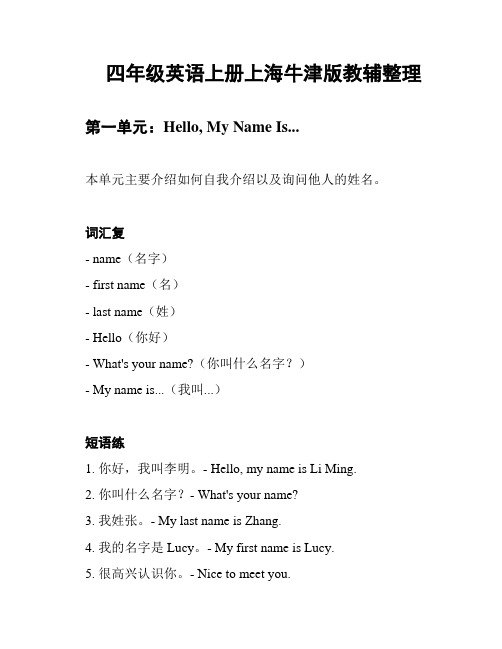
四年级英语上册上海牛津版教辅整理第一单元:Hello, My Name Is...本单元主要介绍如何自我介绍以及询问他人的姓名。
词汇复- name(名字)- first name(名)- last name(姓)- Hello(你好)- What's your name?(你叫什么名字?)- My name is...(我叫...)短语练1. 你好,我叫李明。
- Hello, my name is Li Ming.2. 你叫什么名字?- What's your name?3. 我姓张。
- My last name is Zhang.4. 我的名字是Lucy。
- My first name is Lucy.5. 很高兴认识你。
- Nice to meet you.句型练1. A: Hello, what's your name?B: My name is Tom.2. A: Hi, nice to meet you.B: Nice to meet you too.第二单元:How Old Are You?本单元主要介绍如何询问年龄以及回答年龄。
词汇复- old(年龄)- how(多少)- How old are you?(你多大了?)- I'm... years old.(我...岁了)短语练1. 你多大了?- How old are you?2. 我五岁了。
- I'm five years old.3. 他八岁了。
- He is eight years old.4. 她十岁了。
- She is ten years old.5. 我们六岁了。
- We are six years old.句型练1. A: How old are you?B: I'm six years old.2. A: How old is your sister?B: She is ten years old.以上是《四年级英语上册上海牛津版教辅整理》的内容概要。
沪教牛津版四年级英语上册全册知识点汇总

沪教牛津版四年级英语上册全册知识点汇总Module 1 Getting to know you一、核心词汇1.名词:morning早晨;上午classmate同班同学name名字afternoon下午 woof(狗叫声)汪汪 bird鸟 bottle瓶子2.动词:meet相识;结识 run跑 fly飞;放飞 draw画画 write写字;书写 jump跳 welcome欢迎 see看见 drink喝sit坐3.形容词性物主代词:his他的 her她的4.形容词:happy开心的 sad难过的;悲哀的 tired累的;疲倦的hungry饥饿的 full饱的 thirsty口渴的new新的5.其他:fast 快地;迅速地;快的二、拓展词汇1.名词:noon中午;正午 evening晚上2.形容词性物主代词:my我的 your你(们)的 its它的 our我们的their他们的三、核心短语meet new people认识新人 new classmate新同学 her name她的名字my name我的名字 run fast跑得快 welcome to …欢迎来到…… write one’s name写下某人的名字 have some biscuits吃一些饼干 have some water 喝些水四、核心句型1.Nice to meet you. 很高兴认识你。
解读:这是比较正式的打招呼用语,当和他人初次见面时,可以说“Nice to meet you.”。
当你对他人说这句话时,他人通常会对你说“Nice to meet you,too.”。
举一反三: — Nice to meet you,Li Wei. 很高兴认识你,李伟。
— Nice to meet you,too. 认识你也很高兴。
2.His name’s Joe.他的名字叫乔。
解读:这是介绍他人姓名的句型。
his是形容词性物主代词,后接名词,意为“他的”。
沪教牛津版四年级英语上册全册知识点汇总

沪教牛津版四年级英语上册全册知识点汇总Module 1 Getting to know you一、核心词汇1.名词:morning早晨;上午classmate同班同学name名字afternoon下午 woof(狗叫声)汪汪 bird鸟 bottle瓶子2.动词:meet相识;结识 run跑 fly飞;放飞 draw画画 write写字;书写 jump跳 welcome欢迎 see看见 drink喝sit坐3.形容词性物主代词:his他的 her她的4.形容词:happy开心的 sad难过的;悲哀的 tired累的;疲倦的hungry饥饿的 full饱的 thirsty口渴的new新的5.其他:fast 快地;迅速地;快的二、拓展词汇1.名词:noon中午;正午 evening晚上2.形容词性物主代词:my我的 your你(们)的 its它的 our我们的their他们的三、核心短语meet new people认识新人 new classmate新同学 her name她的名字my name我的名字 run fast跑得快 welcome to …欢迎来到…… write one’s name写下某人的名字 have some biscuits吃一些饼干 have some water 喝些水四、核心句型1.Nice to meet you. 很高兴认识你。
解读:这是比较正式的打招呼用语,当和他人初次见面时,可以说“Nice to meet you.”。
当你对他人说这句话时,他人通常会对你说“Nice to meet you,too.”。
举一反三: — Nice to meet you,Li Wei. 很高兴认识你,李伟。
— Nice to meet you,too. 认识你也很高兴。
2.His name’s Joe.他的名字叫乔。
解读:这是介绍他人姓名的句型。
his是形容词性物主代词,后接名词,意为“他的”。
牛津英语上海版四年级上册教材内容总结
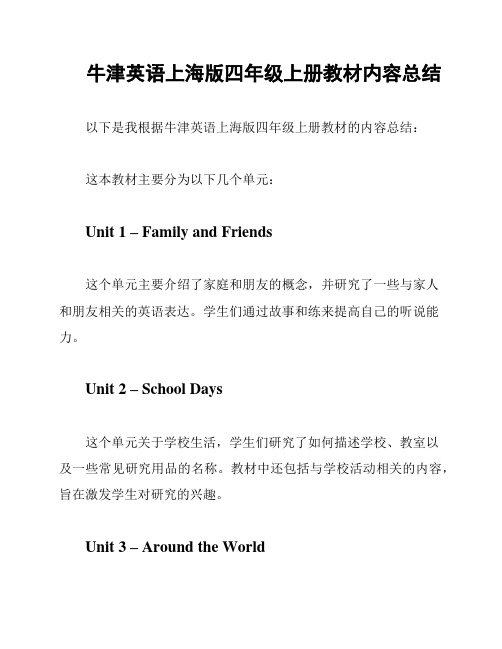
牛津英语上海版四年级上册教材内容总结以下是我根据牛津英语上海版四年级上册教材的内容总结:这本教材主要分为以下几个单元:Unit 1 – Family and Friends这个单元主要介绍了家庭和朋友的概念,并研究了一些与家人和朋友相关的英语表达。
学生们通过故事和练来提高自己的听说能力。
Unit 2 – School Days这个单元关于学校生活,学生们研究了如何描述学校、教室以及一些常见研究用品的名称。
教材中还包括与学校活动相关的内容,旨在激发学生对研究的兴趣。
Unit 3 – Around the World这个单元带领学生们探索世界各地的文化和风俗惯。
教材中涵盖了一些国家和他们的传统特色,学生们通过分享和交流来了解不同文化之间的差异和相似之处。
Unit 4 –Let’s Celebrate这个单元主要介绍了一些节日和庆祝活动的英语表达。
学生们了解了一些全球性的节日,如圣诞节和万圣节,并研究了一些相关的词汇和短语。
Unit 5 – Nature and Animals这个单元围绕自然和动物展开,学生们研究了一些与大自然和动物有关的知识。
教材中还包括了一些保护环境和动物的话题,旨在培养学生的环保意识。
Unit 6 – Fun and Games这个单元关于游戏和娱乐活动,学生们研究了一些与玩具、游戏和运动相关的英语表达。
教材中还包括了一些游戏规则和玩法的介绍,旨在培养学生的团队合作和沟通能力。
以上是牛津英语上海版四年级上册教材的内容总结。
通过这些单元的学习,学生们能够提高自己的听说能力,丰富自己的词汇量,并了解更多有关家庭、朋友、学校、文化、自然、动物、节日以及游戏等方面的知识。
四年级英语上册上海牛津版教材整理

四年级英语上册上海牛津版教材整理Unit 1: Greetings and ns- Vocabulary: greetings (hello。
hi。
good morning。
good afternoon。
good evening。
good night) and ns (What's your name。
My name is。
How old are you。
I'm。
Nice to meet you.)- Grammar: Simple present tense of "to be" (am。
is。
are)Unit 2: Numbers- Vocabulary: numbers 1-20 and multiples of 10 up to 100- Grammar: Counting using numbers。
e.g。
"How many apples are there。
There are 10 apples."Unit 3: Colors- Vocabulary: colors (red。
blue。
yellow。
green。
etc.)- Grammar: Using colors to describe objects。
e.g。
"I have a red pencil."Unit 4: Family- Vocabulary: family members (father。
mother。
brother。
sister。
etc.)- Grammar: Using possessive pronouns (my。
your。
his。
her) to talk about family members。
e.g。
"This is my sister."Unit 5: Animals- Vocabulary: us animals (dog。
四年级英语上册上海牛津版读物整理
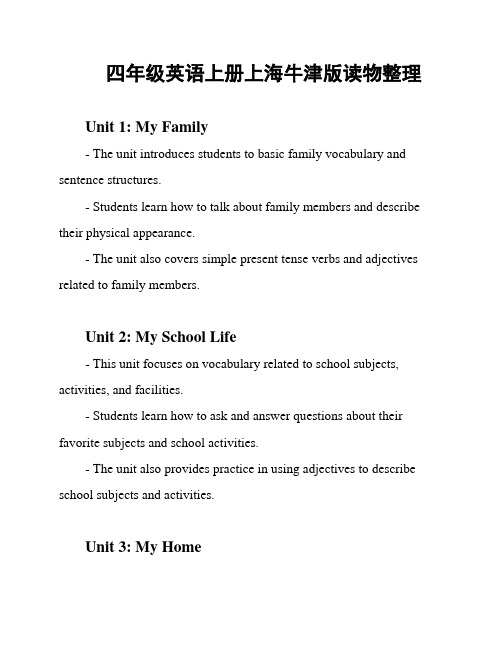
四年级英语上册上海牛津版读物整理Unit 1: My Family- The unit introduces students to basic family vocabulary and sentence structures.- Students learn how to talk about family members and describe their physical appearance.- The unit also covers simple present tense verbs and adjectives related to family members.Unit 2: My School Life- This unit focuses on vocabulary related to school subjects, activities, and facilities.- Students learn how to ask and answer questions about their favorite subjects and school activities.- The unit also provides practice in using adjectives to describe school subjects and activities.Unit 3: My Home- In this unit, students explore vocabulary related to different rooms in a house and furniture.- They learn how to talk about their own home and describe the rooms and furniture using adjectives.- The unit also introduces prepositions of place to describe the location of objects within a room.Unit 4: My Daily Routine- This unit teaches students how to talk about their daily activities and routines.- They learn vocabulary related to daily activities such as waking up, brushing teeth, eating breakfast, etc.- The unit provides practice in using adverbs of frequency to describe how often they do certain activities.Unit 5: My Toys- In this unit, students learn vocabulary related to different types of toys and games.- They learn how to express their preferences and describe toys using adjectives.- The unit also covers verbs related to playing with toys and games.Unit 6: My Body- This unit focuses on vocabulary related to different body parts.- Students learn how to talk about their body parts and describe their own and others' physical features.- The unit provides practice in using possessive pronouns to talk about body parts.Unit 7: My Food- In this unit, students explore vocabulary related to different types of food.- They learn how to talk about their favorite foods and express their likes and dislikes.- The unit also introduces quantifiers to describe the amount of food.Unit 8: My Clothes- This unit teaches students vocabulary related to different types of clothing.- They learn how to talk about what they wear and describe their own and others' clothing.- The unit provides practice in using adjectives to describe clothing.Unit 9: My Neighborhood- In this unit, students learn vocabulary related to different places in a neighborhood.- They learn how to give directions and describe the location of places using prepositions.- The unit also introduces basic map reading skills.Unit 10: My Pets- This unit focuses on vocabulary related to different types of pets.- Students learn how to talk about their own pets and describe pets using adjectives.- The unit provides practice in using possessive adjectives to talk about ownership.以上是四年级英语上册上海牛津版读物的整理内容,包括了各个单元的主题和学习内容。
牛津英语上海版四年级上册知识点整理
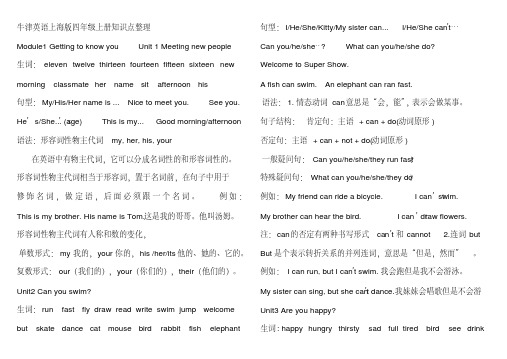
牛津英语上海版四年级上册知识点整理Module1 Getting to know you Unit 1 Meeting new people生词: eleven twelve thirteen fourteen fifteen sixteen new morning classmate her name sit afternoon his句型:My/His/Her name is ... Nice to meet you. See you. He’s/She’s... (age) This is my... Good morning/afternoon 语法:形容词性物主代词 my, her, his, your在英语中有物主代词,它可以分成名词性的和形容词性的。
形容词性物主代词相当于形容词,置于名词前,在句子中用于修饰名词,做定语,后面必须跟一个名词。
例如:This is my brother. His name is Tom. 这是我的哥哥。
他叫汤姆。
形容词性物主代词有人称和数的变化,单数形式:my我的,your你的,his /her/its他的、她的、它的。
复数形式:our(我们的),your(你们的),their(他们的)。
Unit2 Can you swim?生词:run fast fly draw read write swim jump welcome but skate dance cat mouse bird rabbit fish elephant 句型:I/He/She/Kitty/My sister can... I/He/She can’t…Can you/he/she…? What can you/he/she do?Welcome to Super Show.A fish can swim. An elephant can ran fast.语法: 1. 情态动词can 意思是“会,能”,表示会做某事。
[全]沪教牛津版四年级英语上全册单元知识点考点总结
![[全]沪教牛津版四年级英语上全册单元知识点考点总结](https://img.taocdn.com/s3/m/3b50c2f1ee06eff9aff80759.png)
沪教牛津版四年级英语上全册单元知识点考点总结Unit l Meeting new people知识梳理一、Words:1.meet结识2.new新的3.morning早晨4.classmate同班同学5. her她的6.name名字7.sit坐8.afternoon下午9.his他的10. boy男孩11. here这里12. sister姐姐,妹妹13. girl女孩14. brother兄弟15. nice好的二、Phrases:1. good morning早上好2.good afternoon下午好3.sit here坐在这儿4.your new classmate你的新同学5.my name我的名字6.my classmate我的同学7.her name她的名字8.his name他的名字三、Sentences:1.Nice to meet you.见到你很高兴。
2.My name is Jill.或My name's Jill.我的名字叫Jill。
3.This is your new classmate.这是你的新同学。
4.Her name's Kitty.她的名字叫Kitty。
5.You can sit here.你可以坐在这儿。
6.This is my brother.这是我的兄弟。
7.What about you? 你呢?/你怎么样呢?重点点拨1.Nice to meet you.在第一次见面相互认识时经常会用这句话来问候对方,回答时经常会说Nice to meet you,too.2.注意形容词性物主代词(简称“形物代”)的使用:my(我的),your(你的),his(他的),her(她的),its(它的),our(我们的),your(你们的),their(他们的,她们的,它们的):这些形容词性物主代词后面一定要接名词,即要接人或物。
单词播音园大声朗读下列短文,体会粗写的单词中字母a的发音/eɪ/。
完整word版)牛津英语上海版四年级上册知识点整理

完整word版)牛津英语上海版四年级上册知识点整理Module 1 Getting to Know YouUnit 1 Meeting New PeopleIn this unit。
we will learn some new words and sentences to help us when we meet new people。
We will also learn about possessive pronouns and how to use them correctly.New Words: eleven。
twelve。
XXX。
fourteen。
fifteen。
sixteen。
new。
morning。
classmate。
her。
name。
sit。
afternoon。
hisXXX:My/His/Her name is。
Nice to meet you。
See you。
He’s/She’s。
(age)This is my。
XXXPossessive Pronouns:In English。
there are possessive pronouns。
which XXX to modify them。
They must be followed by a noun。
For example: This is my brother。
His name is Tom。
Adjective possessive pronouns change based on person and number:Singular forms: my。
your。
his/her/itsPlural forms: our。
your。
theirUnit 2 Can You Swim?In this unit。
we will learn some new words and XXX。
We will also learn how to use the modal verb "can" to talk about abilities.New Words: run。
牛津英语上海版四年级上册重要知识整理

牛津英语上海版四年级上册重要知识整理以下是牛津英语上海版四年级上册的重要知识整理:单词1. 人称代词:我 - I,你 - you,他 - he,她 - she,它 - it,我们- we,你们 - you,他们 - they。
2. 数字:1 - one,2 - two,3 - three,4 - four,5 - five,6 - six,7 - seven,8 - eight,9 - nine,10 - ten。
3. 形容词:快的 - fast,慢的 - slow,高的 - tall,矮的 - short,大的 - big,小的 - small,长的 - long,短的 - short,多的 - many,少的 - few。
4. 动词:跑 - run,跳 - jump,听 - listen,说 - speak,看 - look,唱 - sing,读 - read,写 - write,吃 - eat,喝 - drink。
句子1. 问候:Hello!(你好!)2. 自我介绍:My name is [name].(我的名字是[name]。
)3. 询问名字:What's your name?(你叫什么名字?)4. 问年龄:How old are you?(你多大了?)5. 询问感受:How do you feel?(你感觉怎么样?)6. 答谢:Thank you!(谢谢!)7. 询问喜欢的食物:What's your favorite food?(你最喜欢的食物是什么?)8. 回答喜欢的食物:My favorite food is [food].(我最喜欢的食物是[food]。
)语法1. 名词复数形式:通常在名词后面加上-s或-es来表示复数,如:cat - cats,box - boxes。
2. 描述词语序:通常形容词在名词前面,如:a big house(一座大房子)。
3. 疑问句形式:将助动词do或does放在句首,如:Do youlike apples?(你喜欢苹果吗?)4. be动词的变化:I am,you are,he/she/it is,we/you/they are。
牛津英语上海版四年级上册知识点整理

牛津英语上海版四年级上册知识点整理Module1 Getting to know you Unit 1 Meeting new people生词: eleven twelve thirteen fourteen fifteen sixteen new morning classmate her name sit afternoon his句型:My/His/Her name is ... Nice to meet you. See you. He’s/She’s ... (age) This is my... Good morning/afternoon语法:形容词性物主代词 my, her, his, your在英语中有物主代词,它可以分成名词性的和形容词性的。
形容词性物主代词相当于形容词,置于名词前,在句子中用于修饰名词,做定语,后面必须跟一个名词。
例如:This is my brother. His name is Tom. 这是我的哥哥。
他叫汤姆。
形容词性物主代词有人称和数的变化,单数形式:my我的,your你的,his /her/its他的、她的、它的。
复数形式:our(我们的),your(你们的),their(他们的)。
Unit2 Can you swim生词:run fast fly draw read write swim jump welcomebut skate dance cat mouse bird rabbit fish elephant句型:I/He/She/Kitty/My sister can... I/He/She can’t…Can you/he/she…What can you/he/she doWelcome to Super Show.A fish can swim. An elephant can ran fast.语法: 1. 情态动词can 意思是“会,能”,表示会做某事。
- 1、下载文档前请自行甄别文档内容的完整性,平台不提供额外的编辑、内容补充、找答案等附加服务。
- 2、"仅部分预览"的文档,不可在线预览部分如存在完整性等问题,可反馈申请退款(可完整预览的文档不适用该条件!)。
- 3、如文档侵犯您的权益,请联系客服反馈,我们会尽快为您处理(人工客服工作时间:9:00-18:30)。
四年级英语上册上海牛津版学习材料整理
一、课本内容
四年级英语上册上海牛津版是一本适合小学四年级学生研究英
语的教材。
该教材包含了多个单元,每个单元都涵盖了不同的主题,如家庭、学校、食物、动物等。
每个单元都有相应的课文、题和活动,以帮助学生提高听、说、读、写的能力。
二、研究资源
该教材还配套了丰富的研究资源,包括学生用书、教师用书和
配套音频。
学生用书包含了每个单元的课文和题,供学生进行课堂
研究和课后复使用。
教师用书则提供了教学指导和课堂活动建议,
帮助教师更好地开展教学工作。
配套音频提供了课文和练的朗读,
使学生可以更好地听懂和模仿。
三、研究目标
研究四年级英语上册上海牛津版的学生应达到以下目标:
1. 提高听说读写的能力:通过听力训练、口语练、阅读理解和
写作练,提高学生的英语综合运用能力。
2. 培养兴趣和自信:通过丰富有趣的内容和多样化的活动,培
养学生对英语研究的兴趣,增强学生对自己语言能力的自信心。
3. 提升跨文化意识:通过了解不同主题和文化背景下的词汇和
表达方式,学生可以增进对世界多样性的理解和认识。
四、教学方法
教师可以采用以下教学方法来有效地教授四年级英语上册上海
牛津版:
1. 多媒体辅助教学:利用多媒体技术,如投影仪、音频设备等,展示课文、图片、视频等,提高学生的研究兴趣和参与度。
2. 合作研究:倡导学生之间的合作研究,鼓励他们互相交流和
合作完成任务,提供合作研究的机会和环境。
3. 轮流发言:鼓励学生轮流发言,提高他们的口语表达能力和自信心。
4. 游戏和活动:利用游戏和活动,创设情境,培养学生的语言运用能力,增强课堂的趣味性和互动性。
以上为四年级英语上册上海牛津版学习材料的整理,希望对您有所帮助。
任何进一步的问题,请随时与我联系。
